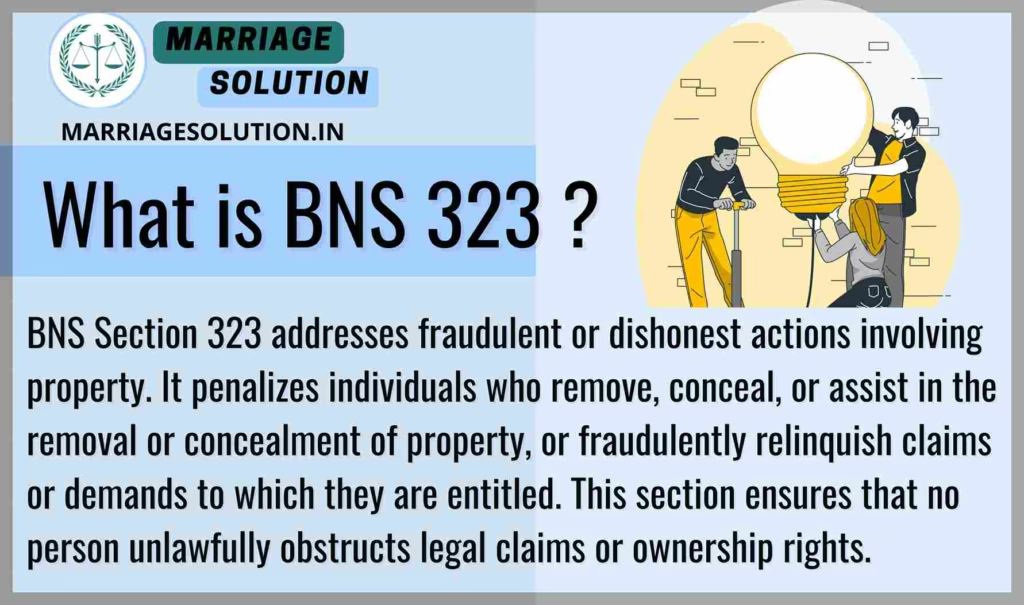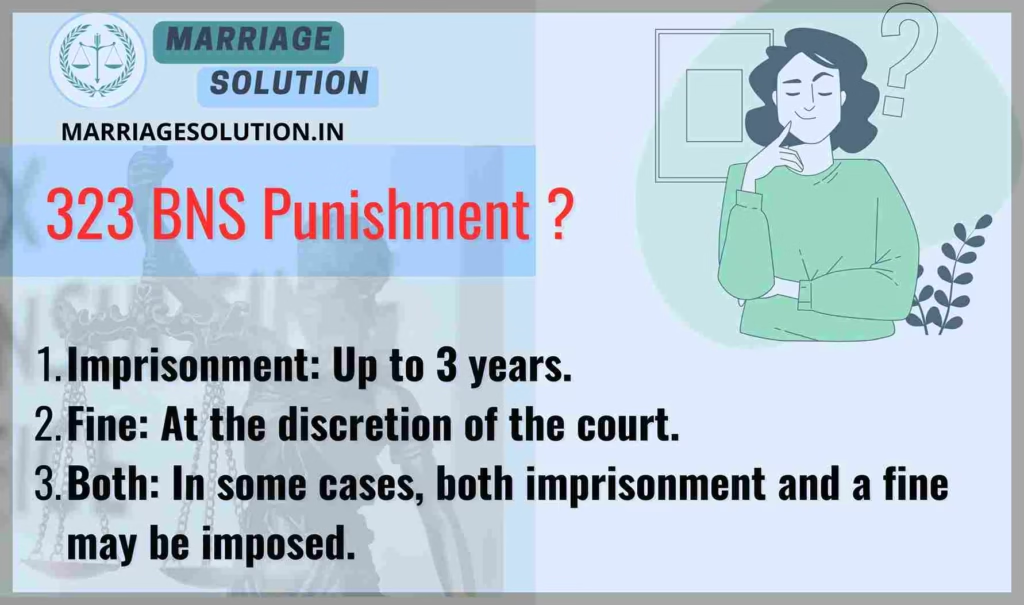Introduction of 323 BNS
BNS 323 deals with dishonest or fraudulent removal, concealment, or release of property claims. It penalizes individuals who hide property, transfer it unlawfully, assist in fraudulent concealment, or dishonestly give up valid claims to obstruct creditors and rightful owners. Replacing IPC Section 424, this provision strengthens protections against property-related fraud and ensures accountability in financial and legal dealings.
The Bharatiya Nyaya Sanhita (BNS) Section 323 replaces the old Indian Penal Code (IPC) Section 423.
What is BNS Section 323 ?
BNS Section 323 addresses fraudulent or dishonest actions involving property. It penalizes individuals who remove, conceal, or assist in the removal or concealment of property, or fraudulently relinquish claims or demands to which they are entitled. This section ensures that no person unlawfully obstructs legal claims or ownership rights.

Under Section 323 of the bns act 2023
“Whoever dishonestly or fraudulently removes, conceals, or assists in the removal or concealment of any property, or dishonestly releases any demand or claim to which they are entitled, shall be punished with imprisonment which may extend to three years, or with fine, or with both.”
1. Meaning of Dishonest Removal or Concealment of Property
- This section criminalizes the fraudulent hiding or removal of property to deprive rightful owners or creditors.
- It covers one’s own property or someone else’s property.
- Dishonest concealment disrupts lawful processes like debt recovery, property distribution, or enforcement of legal claims.
2. Assisting in Fraudulent Actions
- Anyone who helps another person remove or conceal property dishonestly is also punishable.
- Example: Helping a debtor hide assets from creditors is treated the same as committing the fraud directly.
3. Dishonest Release of Claims
- If a person gives up a rightful claim or demand dishonestly to deceive creditors, it is also punishable.
- Example: A businessman dishonestly relinquishes a loan repayment due to him in order to block creditors from attaching that amount.
4. Nature of the Offense
- Bailable → Accused can seek bail.
- Non-Cognizable → Police need Magistrate’s approval before investigating.
- Non-Compoundable → The offense cannot be privately settled outside court.
- Triable by Any Magistrate → Heard before any magistrate.
5. Examples of BNS Section 323
- Example 1 – Concealing Assets: A debtor hides gold at a relative’s house to prevent creditors from recovering dues. → Punishable under this section.
- Example 2 – Fraudulent Transfer: A person dishonestly transfers their car to a friend to avoid seizure by creditors. → Covered under BNS 323.
6. Punishment under BNS Section 323
- Imprisonment: Up to 3 years.
- Fine: Amount as decided by the court.
- Both: In serious cases, both imprisonment and fine may be imposed.
7. Importance of BNS Section 323
- Protects property rights → ensures assets remain available for lawful claims.
- Covers accomplices → punishes those assisting in fraudulent concealment.
- Ensures fairness → prevents dishonest release of legitimate claims.
- Safeguards financial trust → discourages fraud in debt recovery and asset management.
Section 323 BNS Overview
BNS Section 323 addresses dishonest or fraudulent acts involving the removal, concealment, or release of property to harm others or evade legal responsibilities. It includes assisting in such fraudulent activities. The section ensures accountability for any deceitful act related to property management. Punishment includes imprisonment, fine, or both, depending on the offense’s severity.
10 Key Points of BNS Section 323
1. Scope of the Offense:
BNS Section 323 addresses dishonest or fraudulent acts involving the removal or concealment of property. It covers situations where a person either hides their own or someone else’s property with wrongful intent. This ensures legal accountability for actions that deprive rightful owners or creditors of access to the property.
2. Assistance in Concealment or Removal:
The law includes individuals who assist others in fraudulently removing or concealing property. This ensures that accomplices in such acts are also penalized, creating a broader deterrent against fraudulent practices.
3. Release of Claims:
If someone dishonestly releases a demand or claim they are entitled to, it falls under this section. For instance, knowingly giving up a financial claim to deceive creditors is punishable. This provision ensures fair distribution and justice in financial matters.
4. Intent and Fraudulence:
The offense under this section requires dishonest or fraudulent intent. Accidental acts or misunderstandings do not qualify. Intentional deceit to benefit oneself or harm others is the focus, making intent a crucial element.
5. Punishment Details:
The punishment includes imprisonment for up to 3 years, or a fine, or both. The flexible sentencing allows the judiciary to impose penalties based on the severity and circumstances of each case.
6. Bailable and Non-Cognizable Nature:
The offense is bailable, meaning the accused can secure bail, and non-cognizable, requiring a Magistrate’s approval for investigation. This reflects the moderate seriousness of the offense.
7. Triable by Magistrate:
Cases under Section 323 are triable by any Magistrate. This ensures that such cases are resolved efficiently and without undue delays, given their less severe but significant nature.
8. Protection Against Financial Fraud:
The provision safeguards individuals and creditors against fraudulent actions involving property or financial claims. By penalizing deceitful practices, it upholds the integrity of financial and legal transactions.
9. Broad Applicability:
The law applies to any individual engaging in dishonest concealment or removal of property, regardless of their status or relationship to the property owner. It emphasizes fairness and accountability.
10. Examples of the Offense:
Examples include someone hiding their assets to avoid paying creditors or fraudulently transferring property to another person without fair consideration. Such acts disrupt legal processes and are punishable under this section.
2 Examples of BNS Section 323
Example 1:
A debtor hides valuable jewelry at a friend’s house to prevent creditors from claiming it during insolvency proceedings. This act constitutes fraudulent concealment under BNS Section 323.
Example 2:
An individual dishonestly transfers ownership of their car to a relative to evade paying debts. This fraudulent removal of property violates this section.
BNS 323 Punishment
- Imprisonment: Up to 3 years.
- Fine: At the discretion of the court.
- Both: In some cases, both imprisonment and a fine may be imposed.

BNS 323 bailable or not ?
Bailable: The accused has the right to seek bail during the legal process.The offense is non-cognizable, meaning police need a Magistrate’s permission to investigate.Trials for offenses under this section are conducted by any Magistrate.
Comparison: BNS Section 323 vs IPC Section 424
| Section | Offense | Punishment | Bailable / Non-Bailable | Cognizable / Non-Cognizable | Trial By |
|---|---|---|---|---|---|
| BNS Section 323 | Dishonest or fraudulent removal, concealment, or assistance in removal/concealment of property, or dishonest release of claims. | Imprisonment up to 3 years, or fine, or both. | Bailable | Non-Cognizable | Any Magistrate |
| IPC Section 424 (Old) | Dishonest or fraudulent removal or concealment of property; assisting in removal/concealment; or dishonest release of claims (old IPC wording). | Imprisonment up to 2 years, or fine, or both. | Bailable | Non-Cognizable | Any Magistrate |
BNS Section 323 FAQs
1. What is the main focus of BNS Section 323?
The section addresses fraudulent removal, concealment, or dishonest release of property claims to obstruct rightful distribution.
2. What is the punishment for offenses under BNS Section 323?
The punishment includes imprisonment for up to 3 years, a fine, or both.
3. Is BNS Section 323 bailable?
Yes, it is a bailable offense, allowing the accused to seek bail.
4. Who can try cases under this BNS Section 323 ?
Cases under BNS Section 323 are triable by any Magistrate.
5. Is the BNS 323 offense compoundable?
No, it is non-compoundable, meaning private settlements are not allowed.
Conclusion
BNS Section 323 is a key safeguard against fraudulent property dealings. By penalizing dishonest removal, concealment, or release of property claims, it ensures that creditors and rightful owners are not cheated. With punishment of up to 3 years imprisonment, a fine, or both, the law discourages fraudulent transfers and protects the fairness of financial transactions. As a bailable and non-cognizable offense, it balances due process with effective accountability. For individuals or businesses, this law emphasizes the importance of honesty and transparency in property management to avoid serious legal consequences.
Need Legal Support?
If you are dealing with court cases, marriage problems, or any other legal issue, our team at Marriage Solution – Lawyer Help is here for you. Simply fill out our quick online enquiry form, and we’ll connect you with the right legal expert to support your needs.
Finished with BNS 323 ? Continue exploring the next provisions of the Bharatiya Nyaya Sanhita (BNS), 2023. Each section includes explanations, examples, and plain-language breakdowns for easy understanding.
Of Mischief
- 324 BNS : Mischief.
- https://marriagesolution.in/bns_section/324-bns/
- 325 BNS :Mischief by killing or maiming animal .
- https://marriagesolution.in/bns_section/325-bns/
- 326 BNS : Mischief by injury, inundation, fire or explosive substance, etc.
- https://marriagesolution.in/bns_section/326-bns/
- 327 BNS : Mischief with intent to destroy or make unsafe a rail, aircraft, decked vessel or one of twenty tons burden.
- https://marriagesolution.in/bns_section/327-bns/
Of Criminal Trespass .
- 328 BNS : Punishment for intentionally running vessel aground or ashore with intent to commit theft, etc
- https://marriagesolution.in/bns_section/328-bns/
Full IPC Section List: https://marriagesolution.in/ipc-section-list
All Indian Law & Blogs: https://marriagesolution.in/indian-law/
Full BNSS Section List: https://marriagesolution.in/bnss_section-list
